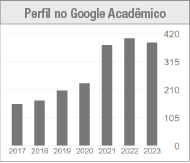The voice in the Suzuki Training
DOI:
https://doi.org/10.5965/1414573103422021e0301Keywords:
Suzuki training, Tadashi Suzuki, Adriana Cavarero, Voice, Contemporary TheaterAbstract
This article explores the matter of voice in Tadashi Suzuki's training and directing work, establishing relationships between the fundamentals of the Japanese director's practice and Adriana Cavarero's thoughts on the theme. This work is the result of the interaction between the hands-on experience with Suzuki training and the reflection based on Cavarero's concepts, especially in regards to the aspect of unity and voice's relational and corporeal nature. It has been observed how the voice in Suzuki's training and in his performances ends up being understood in its universal dimension where, without the ties of semantics, the elements of voice can affect and generate interaction with one another - performers and audience.
Downloads
References
AVANCINI, Atílio; HASHIMOTO CORDARO, Madalena; OKANO, Michiko (Org.). Conceitos Estéticos: do transtemporal ao espacial na arte japonesa. Guarulhos: EFLCH-UNIFESP, 2021.
BAKHTIN, Mikhail. Estética da criação verbal. 4. ed. São Paulo: Martins Fontes, 2003.
BERTOLD, Margot. História Mundial do Teatro. São Paulo: Perspectiva, 2001.
BOGART, ANNE 1 video (43.28). Live Internacional: Fabiano Lodi conversa com Anne Bogart. Publicado pelo canal Leneus Produtora de Arte, 2020. Disponível em: <https://www.youtube.com/watch?v=fheLpvUoKpg&t=1815s>. Acesso em: 29 out. 2020.
BÖHME, Gernot. Die Stimme im Leiblichen Raum. In: KOLESCH, Doris. PINTO, Vito. SCHRÖDL, Jenny (Hg.). Stimm-Welten: Philosophische, medientheoretische und ästhetische Perspektiven. Bielefeld: Transcript, 2009, p.23-32.
CAVARERO, Adriana. Vozes Plurais: Filosofia da expressão vocal. Belo Horizonte: UFMG, 2011.
KUSANO, Darci Yasuko. O que é Teatro Nô. São Paulo: Brasiliense,1984.
LODI, Fabiano. A prática do treinamento como atividade sagrada na SCOT: Tadashi Suzuki e o teatro como modo de vida. Urdimento – Revista de Estudos em Artes Cênicas, Florianópolis, v. 2, n. 25, p.34-48, 2015.
MONTEIRO, Juliana. Quando a Técnica transborda em poesia: Tadashi Suzuki e suas disciplinas de atuação. São Paulo, 2009. Dissertação (Mestrado) – ECA – Escola Comunicação e Arte - Universidade de São Paulo, São Paulo, 2009.
SUZUKI, Tadashi. Culture is the Body: the Theatre Writings of Tadashi Suzuki. New York: TCG, 2015.
SUZUKI TADASHI / SUZUKI COMPANY OF TOGA. Japão. Disponível em: https://www.scot-suzukicompany.com/en/profile.php. Acesso em: 15 ago. 2021.
Downloads
Published
How to Cite
Issue
Section
License
Copyright (c) 2021 Urdimento - Revista de Estudos em Artes Cênicas

This work is licensed under a Creative Commons Attribution 4.0 International License.
Copyright Statement
The articles published by the magazine are free to use. The copyright is all assigned to the magazine. The articles whose authors are identified represent the expression from the point of view of their authors and not the official position of the journal Urdimento. The author (s) undertakes whenever publishing material relating to the article published in Revista Urdimento mention the said publication as follows: This article was originally published by Urdimento magazine in its volume (put the volume), number (put the number) in the year of (put the year) and can be accessed at:
http://www.revistas.udesc.br/index.php/urdimento
This work is licensed under a Creative Commons Attribution 4.0 International License.




